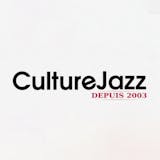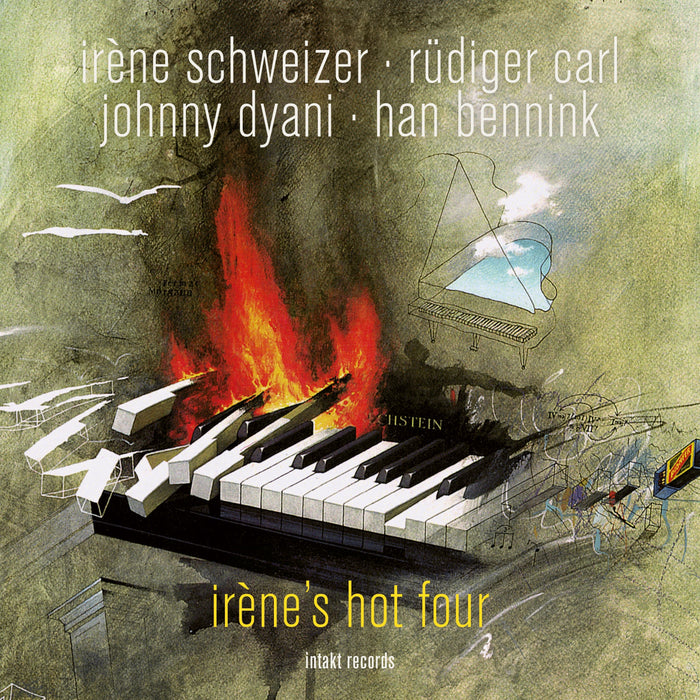
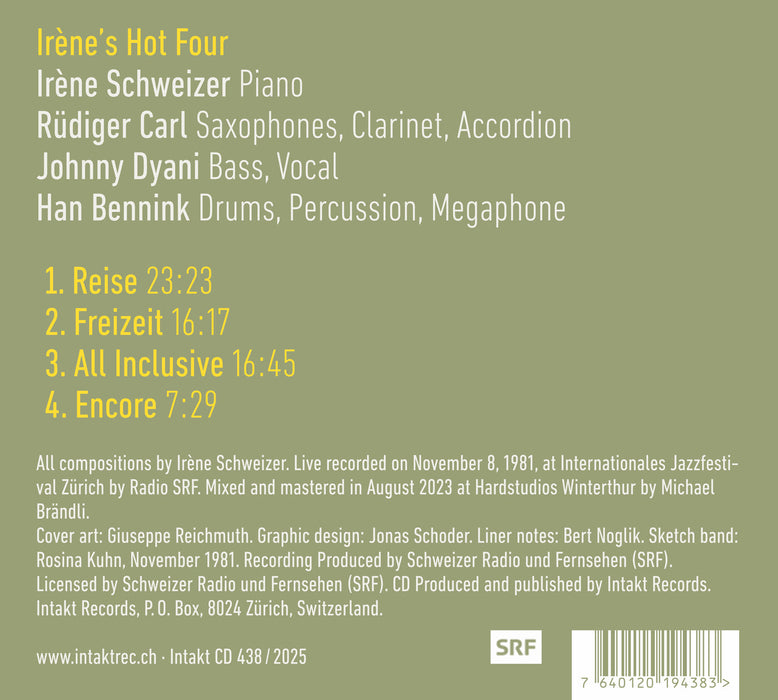
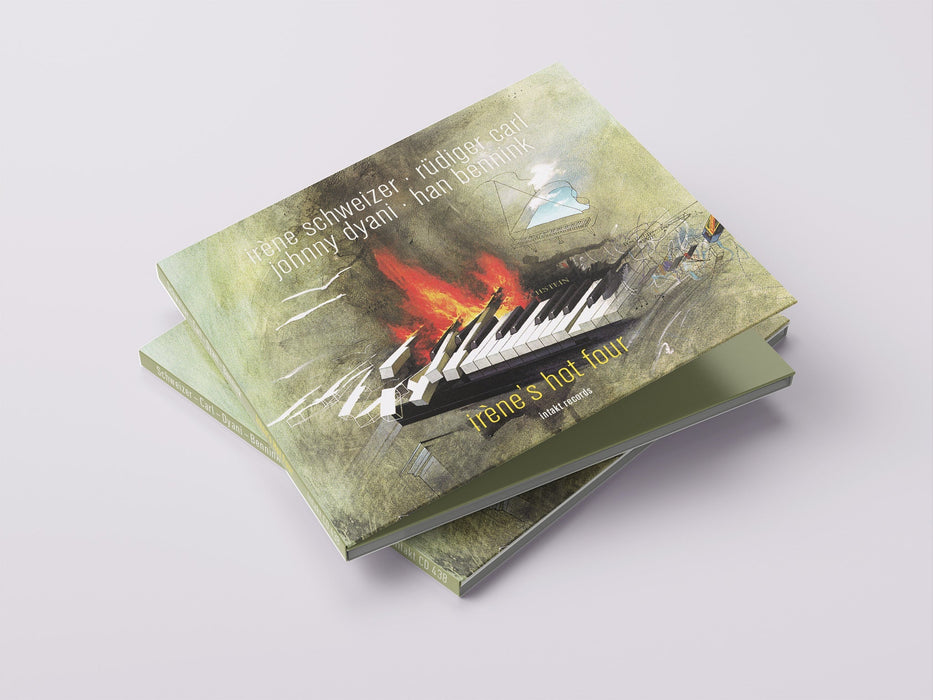
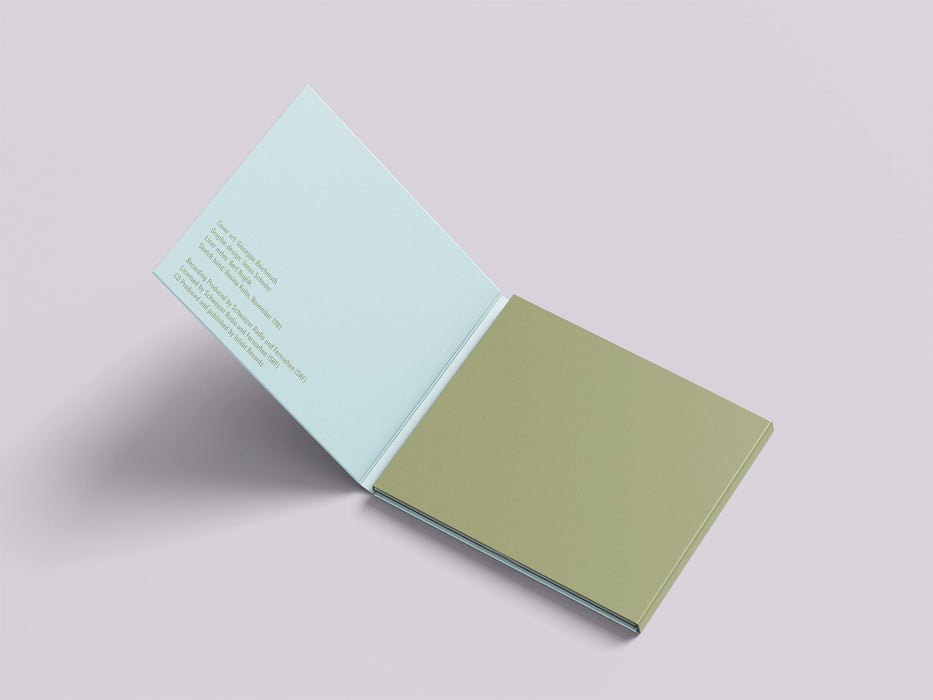
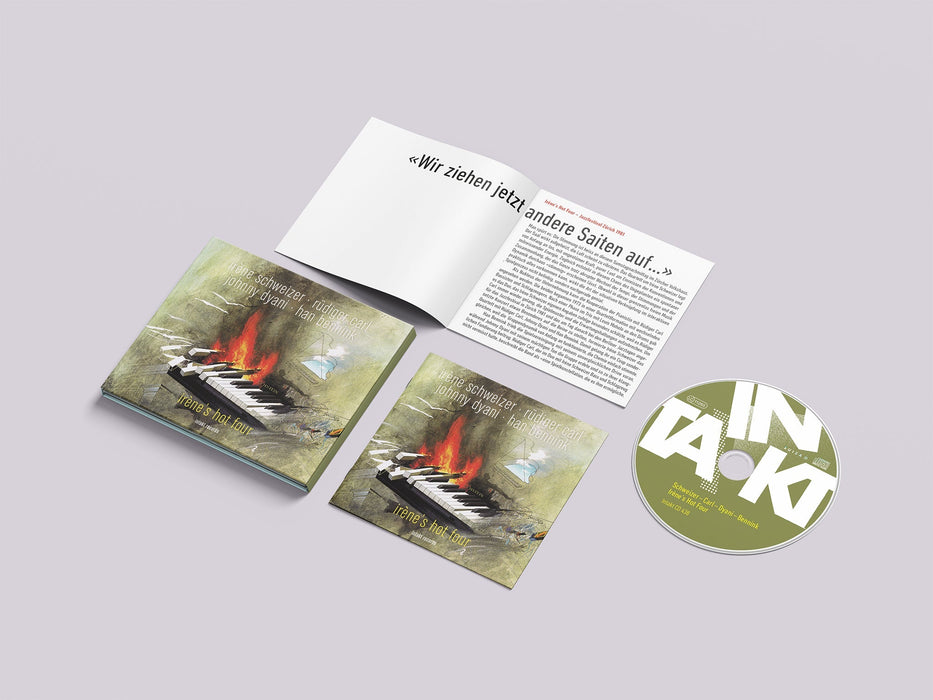
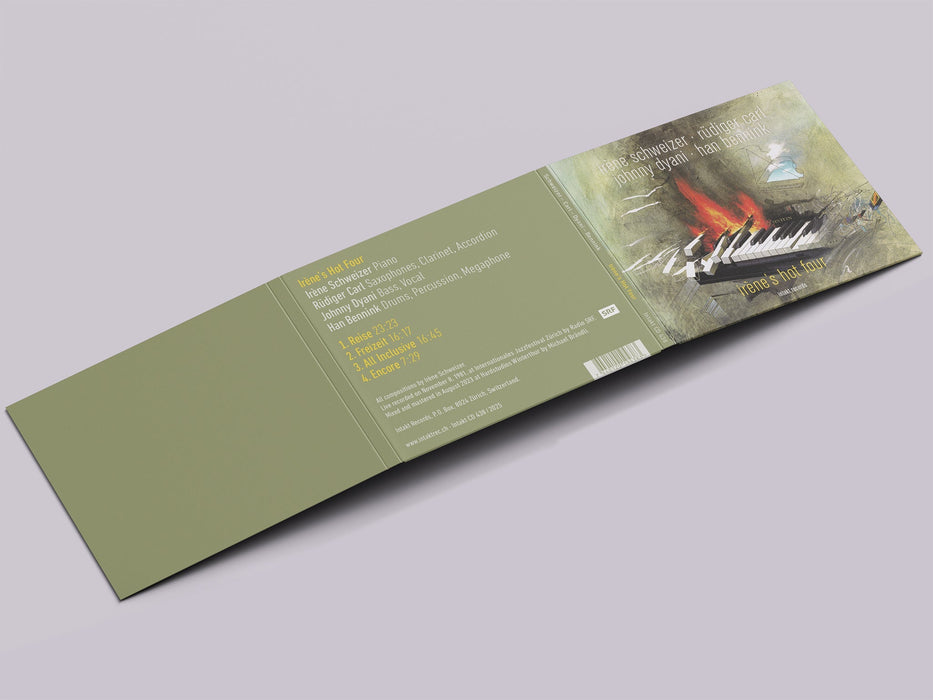
438: IRÈNE SCHWEIZER – RÜDIGER CARL – JOHNNY DYANI – HAN BENNINK. Irène's Hot Four
Intakt Recording #438/ 2025
Irène Schweizer: Piano
Rüdiger Carl: Saxophones, Clarinet, Accordion
Johnny Dyani: Bass, Vocal
Han Bennink: Drums, Percussion, Megaphone
Live recorded on November 8, 1981, at Internationales Jazzfestival Zürich by Radio SRF. Mixed and mastered in August 2023 at Hardstudios Winterthur by Michael Brändli.
More Info
Irène’s Hot Four is a resounding posthumous release from the great jazz pianist, activist and icon Irène Schweizer, who died last year. The publishing of this first concert by the quartet with her companions Rüdiger Carl, Johnny Dyani and Han Bennink – which existed for around a year and a half and only played a handful of gigs – closes a gap in the pianist’s discography. "The concert with the Irène Schweizer Quartet in Zurich 1981 demonstrates a theatrical performance that remains musically coherent despite the spectacle. The music is action-oriented, pushy, and takes on an urgency and bidding character through constantly interwoven repetitions. This snapshot resembles a manifesto. This is Jazz with the anger of a Charles Mingus, the boldness of a Fats Waller and the energy of punk", writes Bert Noglik in the liner notes.
Album Credits
All compositions by Irène Schweizer. Live recorded on November 8, 1981, at Internationales Jazzfestival Zürich by Radio SRF. Mixed and mastered in August 2023 at Hardstudios Winterthur by Michael Brändli. Cover art: Giuseppe Reichmuth. Graphic design: Jonas Schoder. Liner notes: Bert Noglik. Sketch band: Rosina Kuhn, November 1981. Recording produced by Schweizer Radio und Fernsehen (SRF). Licensed by Schweizer Radio und Fernsehen (SRF). CD produced and published by Intakt Records, P.O. Box, 8024 Zürich, Switzerland. www.intaktrec.ch
Generously supported by Robert D. Bielecki Foundation.
The end of the year and its corresponding flood of obligatory “Best Of” lists is always a helpful time for readers to learn about music they missed, forgot about, or reevaluate records they initially reacted to as “meh.”
These lists are particularly valuable for musicians who don’t receive much press–although with music journalism’s death rattles growing louder every year, most music that deserves coverage goes unnoted–and is especially so for avant garde music.
So now it’s my turn to get in the year-end list game and give some love to avant garde jazz(ish) albums. I make no claim to these being the best and I did not rank them. Aside from the obvious requirement that the album has to kill, there are only three rules for making this list:
1. It must be in the jazz, improvisation, and adjacent universe. Otherwise I’d have a tough time figuring out how to rationalize including Fatboi Sharif’s Goth Girl on the Enterprise, Raven Chacon’s latest noise/electronic collaboration, and post-minimalism from Icelandic composer Hildur Guðnadóttir on the same list as a bunch of weird jazz(ish) records.
2. Except for one or two exceptions, the music has to sound like nothing I’ve quite heard before. If it sounds like Pharoah Sanders could have recorded in 1967 and there’s no new wrinkle to it, it’s not avant garde.
3. No more than one album per artist or per label so that I can spread the love.
Here, in the order that I’ve listened to them the most, are my favorite ten boundary-pushing gems from 2025.
Recorded at the 1981 Jazzfestival Zurich and available now for the first time, Irène’s Hot Four is a summit meeting between four distinguished free jazz heads of state. A lot of European free jazz might get a bad rep, although sometimes deservedly so, for a “grip it and rip it” approach where the band dials up the wailing, bashing, and banging to 11 and keeps it there. Swiss pianist Irene Schweitzer, Dutch drummer Han Bennink, German saxophonist Rüdiger Carl, and South African by way of England bassist Johnny Dyani take a different approach.
Over three long romping tracks and a spirited encore, the quartet creates new scenes and vignettes each with their own story. There might be a duet between Carl and Bennink that quickly moves into a wild manic ride with just the rhythm section. Or Schweitzer, who passed away last year, might play the inside of the piano. Sure there’s some bombast and wild abandon, but there’s playful absurdity, melodicism, and moments of quiet as well. Carl swaps out his saxophone for accordion here and there to change the entire group sound, often leading into good natured parody and farce.
Twisted oom-pah bass and polka? Yes please. Bennink can be the world’s loudest or softest drummer, and there isn’t anything he won’t try to get away with. The voice on the megaphone on “All Inclusive”—that’s his. There is a sense of joy throughout the concert, as the Hot Four never seem to run out of ideas or the technique, energy, and musicianship to pull them off. Every moment is fresh and inspired. To me, this set demonstrates the height of free improvisation—European or otherwise.
RIYL: All-Star games; a ****-hot good time
https://www.passionweiss.com/2025/12/17/the-10-best-avant-garde-albums-of-2025/
Although the "pioneer" label may reflect her role through the decades, it does not completely convey the importance of late pianist Irène Schweizer's contributions to modern art. Aside from the impact that the Swiss pianist's music has had on certain players (including, in this reviewer's case, an enhanced perspective on contrapuntal extemporization and the capacity to stay composed across turbulence), the expressions that arise when I think of Schweizer's music, or observe her gaze up close, are "coherence" and "articulation."
Schweizer's oblique, unpremeditated movements on the keyboard were directed by a thorough awareness of her position within a sonic continuum. Her phrasing always revealed reference points, veritable "acoustic beacons" to assist us in decoding the message. And, last but not least, that scintillating inventiveness — comprising a mastery of extended techniques and preparations — was truly uncommon.
Given all the reasons stated above and beyond, what is offered here by Intakt —; Schweizer's enduring "home" during most of her career — should be embraced with genuine excitement. Irène's Hot Four serves as the audio documentation of the inaugural act by a group of exceptional musicians. Along with the nominal leader, the ensemble is shaped by Rüdiger Carl on accordion, sax and clarinet, Johnny Dyani on double bass and voice, and Han Bennink on drums, percussion and megaphone. Each artist warrants an individual story, of course, but what is significant in this situation is the outcome of their instrumental (and, on occasion, theatrical) interaction for the listener's advantage. This set, taped by Radio SRF at the 1981 edition of Internationales Jazzfestival Zürich, was praised by local media as a peak of the event. Upon listening to the recording, one cannot help but agree with that assessment, joining the audience's enthusiastic response at the end of each piece in the time machine of the mind.
In spite of the fact that this was their introductory concert, the participants sound as if they had rehearsed together since childhood, effortlessly seeking, finding, prompting and reacting through superb improvisational skills. The high caliber of the interplay and the diverse sensations of tension and release it generates — from fast-paced, ever-changing superimpositions to circus comedy, from anarchic clatter to the clever organization of spontaneous themes — could be discussed for ages without fully grasping the kind of creative spark that ignited the inner dynamics of these beings, immersed in their own "stage reality" and revitalized by the energy they shared with one another. The gift for us is an exhilarating series of genre-jumping scenarios where Schweizer, Dyani, Carl and Bennink function as distinct leaders who have no need for a negotiating table, the term "compromise" seemingly not appealing to any of them. Accordingly, the distinctiveness of the single voices becomes a combination of twists and turns that surpasses styles, norms and tired ideals, in the interest of a "right now" that conceals expectations for a utopian future.
This is an unquestionable must, from which newcomers might start to delve into Schweizer's recorded history. Collaborations like this, alongside solo piano milestones such as 1996's Many And One Direction, also on Intakt, illustrate the vast expressive range of this empathetic, tenacious, quick-witted woman. Should someone genuinely wish to engage in serious study, do complement these and any additional resources with the outstanding book by Christian Broecking, This Uncontainable Feeling of Freedom: Irène Schweizer — European Jazz and the Politics of Improvisation, which includes, among other features, a photo of Cecil Taylor — indeed — intently observing a Schweizer live performance from backstage. Nothing more needs to be said.
https://www.squidco.com/cgi-bin/news/newsView.cgi?newsID=2950
Irène Schweizer und die „Hot Four“ – Andere Saiten
Ein Rückblick auf die wilden Achtziger mit Irène Schweizer und ihrem Quartett „Hot Four“.
Das soll ein Rückblick sein? Man kann das kaum glauben: diese Hitze, dieser Aktionismus, dieser Übermut vom ersten Augenblick an. Aber so war das damals: In Zürich hatte im Jahre 1980 der Stadtrat für die Renovierung der Oper 60 Millionen Franken genehmigt und gleichzeitig jegliche Forderung nach einem autonomen Jugendzentrum abgelehnt. Die Folge waren die später so genannten Opernhauskrawalle, von denen unter anderem der Film „Züri brännt“, Reto Hännys erfahrungsgesättigtes Buch „Zürich, Anfang September“ und 2020 sogar ein Zürich-Tatort künden.
Das Quartett „Irènes Hot Four“ um die Free-Jazz-Pianistin Irène Schweizer nimmt auf dem Jazzfestival in Zürich am 8. November 1981 ohne Zögern all die umgebende Unruhe auf und leitet sie ans Publikum weiter. Man spürt sofort die gemeinsame Empörung, man spürt die Lust am kollektiven Nichtbeachten und Auflösen konventioneller Regeln, an der direkten Aktion, der heftigen Verausgabung. Man spürt aber auch zuweilen das Moment des Nicht-Beherrschens dieser großen Schritte ins Freie – ein Nicht-Beherrschen, das nicht in Unsicherheit und Vorsicht mündet, sondern in weiteren Bewegungen nach vorn, einer Bewegung, die sich in Musik übersetzt.
Zu Irène Schweizers Quartett gehören am Akkordeon sowie an Saxofonen und der Klarinette Rüdiger Carl, am Bass der aus Südafrika nach Europa gezogene Johnny Dyani und der anarchoide niederländische Schlagwerker Han Bennink. Es ist ein Quartett, in dem viele Fäden zusammenlaufen und das trotz seiner enormen Diversität merkwürdig geschlossen agiert. Ein dichtes, geradezu feinnerviges Geflecht entsteht im unruhigen Getümmel, bei dem jeder seinen Platz hat und diesen Platz jederzeit verlassen kann.
Wie nebenher im wilden Treiben
Die manchmal fast brachiale Gruppenenergie treibt die Musiker*in immer wieder an Grenzen und vielleicht auch über sie hinaus. Rüdiger Carl hebt manchmal geradezu ab, während Johnny Dyani unbeirrbar geerdet das Ganze mit seinem machtvollen Ton grundiert und Han Bennink den Spielprozess mit einem ständig variierenden und klanglich bruchreichen Drive unerbittlich voran treibt. Mittendrin ist Irène Schweizer mit ihrem kraftvoll perkussiven Spiel und immer wieder mit plötzlichen virtuosen, tonal vertrackten Solo-Ausflügen zu hören. Wobei Virtuosität nicht ausgestellt wird, sondern wie nebenher im wilden Treiben entsteht.
War das Free Jazz? Eher schon ein Ereignis, das den Claim dieser seinerzeit noch vergleichsweise jungen Musikrichtung fast explosiosartig erweiterte, hinein in einen emotional grundierten Aktionismus. Etwas, was in der Schweiz in der Luft lag – damals.
Niemand spielt heute so
Einen Tag später gab das Quartett ein Konzert bei den Berliner Jazztagen. Bert Noglik zitiert in den Liner Notes die Berliner Ansage von Michael Naura: „Meine Damen und Herren, wir verlassen jetzt das Land der sogenannten schönen Harmonien und des artig trottenden Rhythmus und ziehen jetzt andere Saiten auf.“
Also ein Rückblick. Andere Saiten sind seitdem des Öfteren aufgezogen worden, wenn auch kaum je mit dieser Energie und Intensität. Der Verein „Freund*innen von Irène Schweizer“ hat jetzt dafür Sorge getragen, dass dieses singulär ausdrucksreiche Zeitdokument auf CD erscheinen konnte. Es ermöglicht eine erstaunliche Begegnung mit dieser von Grund auf rebellischen Musik. Niemand spielt heute so. Obwohl es vielleicht Gründe gäbe.
Auch interessant
https://www.fr.de/kultur/musik/irene-schweizer-und-die-hot-four-andere-saiten-93931986.html
Époustouflant ! Prodigieux ! À couper le souffle, à se renverser de sa chaise ! Il y avait des années que je n’avais pas écouté un disque pareil, Un véritable moment de grâce comme j’en ai rarement été témoin, pour mon plus grand bonheur.
Bien que se connaissant tous, c’est la première fois que les musiciens se réunissaient tout les quatre. Personne ne prend le dessus, les voix s’entrecroisent naturellement dans une totale spontanéité. Irène Schweizer se dépasse en tant que catalyseur, sur son piano de feu, le contrebassiste Johnny Dyani rayonne, le batteur Han Bennink, ahurissant, est impliqué comme rarement, et une mention spéciale à Rüdiger Carl, dont on n’a jamais fait grand cas en France où il s’est pourtant produit à plusieurs reprises et qui, depuis 1973, était le partenaire régulier d’Irène.
Le public est transporté, cela se sent aux applaudissements généreux et enthousiastes ; il sait qu’il est témoin d’un grand moment. La sensation du festival, comme l’écrit Bert Noglik qui vous raconte cette performance bien mieux que je ne saurais le faire.
Merci à Intakt d’avoir exhumé ce concert exceptionnel capté en 1981. ; il aurait manqué quelque chose à notre connaissance de cette tranche de Nouvelle Musique Européenne, qui s’avère être aussi du grand jazz, parfois même classique, servi par un swing renversant.
Il faudrait faire écouter ce disque à tous les jeunes “jazzmen”, dans tous les conservatoires et les classes de jazz, pour essayer de leur faire comprendre l’urgence absolue de cette musique libre et inspirée.
https://www.culturejazz.fr/spip.php?article4429
https://drive.google.com/file/d/1QMy7-UfOGdzVUI_wRVdH_AKRwCyj04GB/view?usp=drive_link
Irene Schweizer - Rudiger Carl - Johnny Dyani - Han Bennink: Irène's Hot Four
Irène's Hot Four represents a significant posthumous release from the legendary Swiss jazz pianist Irène Schweizer, who passed away in 2024. This release captures a rare 1981 concert in Zurich featuring Schweizer alongside her companions Rudiger Carl, Johnny Dyani, and Han Bennink. It is a quartet that existed for only around a year and a half, playing just a handful of performances. The album fills an important gap in Schweizer's discography, documenting this ephemeral but vital collaboration between four master improvisers. The release highlights the pianist's bold free jazz style during a vibrant era of European improvised music.
"All Inclusive" is an adventurous 16-minute track that demonstrates the quartet's remarkable chemistry and boundless energy through a series of interlocking improvisational passages that build from delicate interplay to explosive collective intensity. Schweizer's piano work anchors the composition with percussive clusters and melodic fragments that dance between prepared piano textures, introspective mini- motifs, and traditional jazz harmonies, merged with bluesy phrasings. Carl's reeds provide both lyrical counterpoint and textural disruption, while Dyani's bass oscillates between rhythmic foundation and melodic exploration.
Bennink's drumming proves characteristically inventive, incorporating extended techniques and theatrical elements that complement the music's dramatic arc. The track exemplifies the group's ability to balance individual expression with collective cohesion, creating music that feels both spontaneous and architecturally sound. This is free jazz at its most communicative and emotionally direct.
https://www.allaboutjazz.com/irenes-hot-four-irene-schweizer-rudiger-carl-johnny-dyani-han-bennink-intakt-recordss
This newly released 1981 Jazzfestival Zurich set by the dynamic Swiss pianist (and feminist improvising icon) Irène Schweizer, who died in 2024, is a superior example of so-called European improvised music, a term that popped up in the late 1960s, a nominal break with American free jazz. In reality it’s an international style open to all, where (shortest version) any improvisers may tap into their folk roots the way American free jazz is infused with the subtleties of the blues.
Schweizer’s quartet wasn’t entirely European -- bassist Johnny Dyani was one of several black South Africans who made their mark on UK and continental scenes, bringing their own folkways (tunefulness, useful organizing principles) to the mix. His throbbing bass is the band’s heartbeat, when his bowing isn’t thickening the background. Three of these players at least draw on the jazz they all had in common -- jazz being improvising’s 20th-century home. Even Euro improvisers who claimed to be done with jazz still played sequential horn solos over piano, bass and drums. Calling this album Irène’s Hot 4 (a band name out of the 1920s or ’30s) declares her proud jazz roots. The early piano greats had strong rhythmic left hands; Schweizer loved bobbing old-school two-beat (and waltzing three-beat) bass patterns, but also played quick leaping low figures in sturdy octaves, atonal boogie-woogie à la Cecil Taylor. The rolling gospel cadences of South Africa’s Abdullah Ibrahim might peek out as well. But her style had its own lean clarity and overt humor.
European folkways are represented by saxophonist Rüdiger Carl, Schweizer’s sometime duo partner. Born in what’s now northeast Poland, Carl largely avoids jazz phraseology on soprano, alto or tenor, even when riffing on a spontaneous motif. He also brought along his Euro-coded accordion, for a bit of chording, fluttering, honking or (non-bluesy) train-chugging. Dutch drummer Han Bennink meanwhile swings madly like his jazz heroes, when not disrupting things away from the traps, yelling through his megaphone or (at the top of the encore) playing surprisingly adept note-bending tongue-stopping country bluesy harmonica -- another link to musical Americana.
Bennink’s gifts include a sure feel for when to cut an episode off before it burns itself out. He has ways of deflecting or deflating things in a hurry, sometimes simply by falling silent, opening up the texture. At such moments his old friend (and occasional duet partner) Schweizer, a drummer herself, might take over the percussion part on grand piano, after laying something over the strings to quickly mute them, to sound more clipped and drumlike. There are moments when each member of the quartet intervenes to initiate a new strategy, tempo or texture, from spare dappled pointillism to slow pastorales to high-energy bust-outs. Over three long spontaneous suites (plus a seven-minute encore that tips their set over an hour) you get a lot more variety than on a typical jazz gig, American or otherwise.
The action can be so dizzying, you occasionally have to stop to suss out who’s playing what. A few vignettes may suggest their range. Dyani begins a down-home vocal chant, and Bennink joins him in friendly call-and-response, via megaphone, and then Schweizer joins in , her lean piano line a third melodic voice, three lines braided. A little later on the same piece, “All Inclusive,” Bennink hears Schweizer slipping into Abdullah Ibrahim-mode, and heads her off before she can get started. On the opener “Reise” -- A Trip -- the quartet slide into a left-right-leftrightleft “street beat” that sounds lifted from a then-current Anthony Braxton march. A moment before, Dyani and Bennink had made a conceptual pun they may not even have noticed: the bassist slowly strums an ascending three-note figure echoing the bugle call “Taps,” as Han plays the stage floor with drumsticks, in tap-dancer rhythm.
Radio engineers working major festivals record under pressure: they have to arrange mics quickly and repeatedly for various lineups, maybe while staying out of the way of other techs providing sound for the hall. Sound recorded by anonymous staffers from Swiss broadcasting’s German-language division (mixed and mastered in 2023 by Michael Brändli) is good, catching Bennink’s occasional antics away from the drums, with only minimal audience rustling heard in quiet passages. Whether Dyani plucks or bows, his amplified bass sound is rubbery in the period fashion. Esoterica: Bernhard Arndt had caught the bassist’s arco sound better, on his “Soweto-Simbabwe-Mississippie-Child-Cry” recorded at Berlin’s 1977 Workshop Freie Musik, but on that night Dyani was playing solo, and FMP’s recordists knew whatever they caught might turn up on record. Jazz fest radio engineers are usually happy just to get through the night. Tomorrow they’ll be doing it all again.
https://www.theaudiobeat.com/music/irenes_hot_four_cd.htm
In copertina la tastiera di un piano, i tasti della prima ottava in fiamme. Più chiaro di così. Doveva rendere l'idea per Irène's Hot Four, i quattro incandescenti di Irene. Lei è Irène Schweizer, dita infiammate sulla tastiera fino allo scorso anno, mente e anima di travolgente intensità, no radicalismo assoluto sul pianoforte, la lezione di Monk, di Taylor, di Waldron suublimata in ondate cinetiche di spaventosa forza. L'etichetta Intakt, (anche per i prossimi lavori) ha recuperato i nastri radiofonici del 1981 per 'International Jazz Festival Zürich, con i fiati di Rüdiger Carl, il basso di Johnny Dyani, la batteria monella di Han Bennink. Che la festa ritorni.
Des pépites comme ça, on en redemande !D’un quartet presque éphémère, le label Intakt vient de dénicher le tout premier concert. Cela se passait au Festival International de Zürich le 8 novembre 1981 (chaude ambiance !) et la timidité semblait hors de cause.
D’emblée, ça sent le souffre. Le jeu d’Irène Schweizer, percussif au possible (on rappellera aux derniers de la classe qu’Irène était aussi une fine « batteuse ») donne le la : ça va chauffer (la pochette avec le clavier en feu vise juste) ! Johnny Dyani semble le plus sage mais quelle délicieuse présence. Han Bennink fait du Bennink : jeu foisonnant, grandes déflagrations de cymbales sans préavis. Rüdiger Carl, acteur essentiel de l’improvisation européenne, détourne les tensions avant de braver une masse déjà hurlante.
L’horizon est grand ouvert ici quand piano préparé, accordéon et contrebasse s’unissent et que s’installent un épisode binaire quasi rock’en’rollien plus stances monkienne (Freizeit) et africanité assumée (All Inclusive). N’en doutons pas, cette freie musik était alors dans sa meilleure phase. Comme je l’écrivais en introduction : on en redemande!
https://www.jazzin.fr/schweizer-carl-dyani-bennink-irenes-hot-four/
There are two mini themes running through this edition of One Man's Jazz: one is musical partners, as in the trio of Sylvain Darrifourcq, saxophonist Manuel Hermia and cellist Valentin Ceccaldi who have released but three recordings in their 13 years of trio-hood yet believe their time spent together has let them develop into one of the most powerful and unique trios playing today. How about pianist Stanley Cowell and trumpeter Charles Tolliver? Their partnership resulted in Strata-East Records. Or consider the duo of pianist Izumi Kimura and drummer Gerry Hemingway which is very much outside typical. Or the duo of trumpeter Peter Evans and bassist Petter Eldh—their long time friendship guarantees original albums like their new Jazz Fest. The idea of a jazz festival where one would invite all manner of guests to appear was the motivation for Evans and Eldh. Festivals and live recordings provide the other mini theme, like Evans & Eldh, the late Swiss pianist Irene Schweizer in a never-heard-before release featuring drummer Han Bennink, Norway's Bliss Quintet at Nat Jazz '24, or Luke Stewart's Silt Remembrance Ensemble. Much more to like in this episode. Enjoy!
https://www.allaboutjazz.com/darrifourcq-hermia-ceccaldi-evans-eldh-and-irene-schweizer-sylvain-darrifourcq




